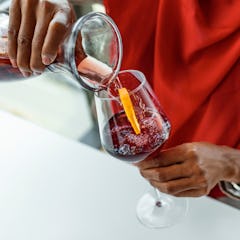Food

Here's When You Can Have That First Celebratory Drink After Giving Birth
Cheers!
You’ve powered through nine plus months of pregnancy, sacrificing your body, your sleep, and your guilty pleasures like soft cheeses, deli meats, and that occasional, relaxing glass of wine. But once you’ve pushed your last push, and are holding your baby in your arms, you may want to indulge in a celebratory drink. You soldiered through your pregnancy, so how soon after giving birth can you drink? You really deserve to relax and unwind.
How long do you need to wait after giving birth before having a drink?
The answer isn’t super simple, and it really depends on whether or not you are planning to breastfeed. If you aren’t going to breastfeed, Dr. Daniel Roshan, MD, OB-GYN at Rosh Maternal-Fetal Medicine in New York City tells The Bump that having a drink right after labor shouldn’t be a problem. But if you are planning on breastfeeding, you may want to reconsider. The American Academy of Pediatrics (AAP) recommended that nursing moms avoid drinking alcohol because it can lead to your baby drinking less milk, and also alter the taste of your milk. That being said, many moms are able to have a drink while nursing because there are ways to safely nurse and drink without affecting the health of your baby.
International Board Certified Lactation Consultant (IBCLC) Kristin Gourley tells Romper that the AAP's section on breastfeeding recommends that moms limit their alcohol intake while breastfeeding and ingest no more than 2 ounces of liquor, 8 ounces of wine, or two beers. Even with a few drinks, however, you should bear in mind that they could affect your milk supply. “Alcohol can also inhibit or slow your letdown,” adds Gourley, “which may make your baby fussy or make him nurse less.”
Can you have a drink if you’re breastfeeding?
So you’d like to have a drink and would like to continue to breastfeed, but how do you know when if it is safe to feed your baby? IBCLC and registered nurse Angie Natero tells Romper that when you drink alcohol, it does transfer to your milk, so you need to wait for it to leave your system. “The only way to remove that alcohol is with time,” explains Natero, “as alcohol will leave the milk like it leaves mom’s blood.” But in the first few days, you should take into consideration that your baby may want to nurse all day to build up your supply, so you may not have too much time between feeding sessions.
Aside from limiting how much you drink, and waiting for the suggested two hours, there are cues you can take from your body that can help you decide whether or not it’s safe to nurse. IBCLC Lori Atkins suggests that if you feel tipsy, that’s a sign that you should not breastfeed. She tells Romper that nursing a glass of wine or beer over a period of time, like over dinner or a movie, is fine, but anything more frequent can alter your milk and make it harder for safe care taking of your baby. If you’re planning on drinking heavily, like for a wedding or event, Atkins suggests pumping and discarding any milk from when you were tipsy so you can keep up your supply.
So if you aren’t planning on breastfeeding, you should be in the clear when it comes to having that celebratory glass of wine or champagne. After what you and your body have been through, you deserve to treat yourself. Whether you want to pop a bottle after the last push, or want to celebrate when you get home, having a drink should be just fine. Just make sure to ask your doctor, especially if you are on any medications. Certain medications can have serious interactions when mixed with alcohol, including pain medications you may be sent home with after delivery, says Chicago pharmacist Bineesh Moyeed. She tells Romper it’s important to discuss any alcohol intake with your physician first.
If you have decided to nurse your baby right after delivery, Natero says that breastfeeding doesn't mean you can never drink, but you should do a little research and plan ahead. If you still aren’t sure on how to safely have a drink when breastfeeding, you can always talk to a lactation consultant or your physician who can give you the best advice for your situation.
Experts:
Kristin Gourley, International Board Certified Lactation Consultant (IBCLC)
Angie Natero, IBCLC
This article was originally published on